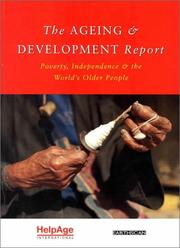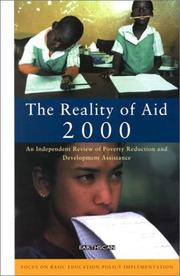| Listing 1 - 6 of 6 |
Sort by
|

ISBN: 1853836486 Year: 1999 Publisher: London Earthscan Publications HelpAge International
Abstract | Keywords | Export | Availability | Bookmark
 Loading...
Loading...Choose an application
- Reference Manager
- EndNote
- RefWorks (Direct export to RefWorks)
The world's population is ageing. The majority of older people live in the developing world, where unprecedented growth in the number of older people has major implications for economies, health systems, housing, working patterns and family relationships. The Ageing and Development Report is the first extensive survey of the issues. Drawing on HelpAge International's long experience in over 60 countries, with contributions from world experts in the field, key themes such as community involvement, family life, health and well-being, poverty and exclusion, gender, migration and economic security are addressed. Case studies and statistics provide a comprehensive review of the condition of older people in the world's poorest countries. The Report argues for a fundamental shift in policy and opinion on ageing to reflect the real economic and social contributions of older people and enable them to retain their independence. It will be essential reading for development policy makers and practitioners in governmental and non-governmental agencies, demographers and gerontologists.
veroudering (verouderingsproces) --- gerontologie --- internationaal perspectief (mondiale invalshoek) --- vieillissement --- gérontologie --- perspective internationale (optique mondiale) --- Aging --- Elderly poor --- Old age assistance --- Older people --- Aged --- Aging people --- Elderly people --- Old people --- Older adults --- Older persons --- Senior citizens --- Seniors (Older people) --- Age groups --- Persons --- Gerontocracy --- Gerontology --- Old age --- Old age benefits --- Economic assistance, Domestic --- Supplemental security income program --- Low-income elderly --- Older poor people --- Poor aged --- Poor elderly --- Poor older people --- Poor --- Age --- Ageing --- Senescence --- Developmental biology --- Longevity --- Age factors in disease --- Social aspects --- Economic conditions --- Social conditions --- Physiological effect --- Developing countries --- Self-help groups --- Low-income older people

ISBN: 1853836613 Year: 2000 Publisher: London Earthscan
Abstract | Keywords | Export | Availability | Bookmark
 Loading...
Loading...Choose an application
- Reference Manager
- EndNote
- RefWorks (Direct export to RefWorks)
BMLIK
Economic assistance. --- armoede --- Economic assistance --- Developing countries
Book
ISBN: 9781853835780 Year: 1998 Publisher: London Earthscan
Abstract | Keywords | Export | Availability | Bookmark
 Loading...
Loading...Choose an application
- Reference Manager
- EndNote
- RefWorks (Direct export to RefWorks)

ISBN: 9264161953 9789264163850 9789264161955 Year: 1998 Publisher: Paris OECD
Abstract | Keywords | Export | Availability | Bookmark
 Loading...
Loading...Choose an application
- Reference Manager
- EndNote
- RefWorks (Direct export to RefWorks)
This collection of studies of public attitudes to development co-operation in OECD Development Assistance Committee (DAC) Member countries demonstrates that the concept of "aid fatigue" is misplaced. A serious lack of adequate knowledge about development co-operation, however, is also revealed. The opinions of policy makers are, therefore, overwhelmingly important and development education efforts should be specifically addressed to them. The book also demonstrates that the role of NGOs is important in general development education. Not only do these organisations mobilise their members in the development field, but their activities create a fund of information within their societies. Remarkable progress by both governments and NGOs has been made during the 1990s in improving co-operation domestically and in operational development activities in the field. Most DAC Member countries have significantly increased the involvement of NGOs in their development efforts, and most NGOs have become increasingly effective in their work. The editors conclude that NGOs and governments both need to work towards more and better public and political-level understanding of development efforts. This will require a wide range of complementary activities, some of which are best undertaken by NGOs, and others by government agencies.


ISBN: 9264161953 9789264163850 9789264161955 9264163859 Year: 1998 Publisher: Paris : OECD Publishing,
Abstract | Keywords | Export | Availability | Bookmark
 Loading...
Loading...Choose an application
- Reference Manager
- EndNote
- RefWorks (Direct export to RefWorks)
This collection of studies of public attitudes to development co-operation in OECD Development Assistance Committee (DAC) Member countries demonstrates that the concept of "aid fatigue" is misplaced. A serious lack of adequate knowledge about development co-operation, however, is also revealed. The opinions of policy makers are, therefore, overwhelmingly important and development education efforts should be specifically addressed to them. The book also demonstrates that the role of NGOs is important in general development education. Not only do these organisations mobilise their members in the development field, but their activities create a fund of information within their societies. Remarkable progress by both governments and NGOs has been made during the 1990s in improving co-operation domestically and in operational development activities in the field. Most DAC Member countries have significantly increased the involvement of NGOs in their development efforts, and most NGOs have become increasingly effective in their work. The editors conclude that NGOs and governments both need to work towards more and better public and political-level understanding of development efforts. This will require a wide range of complementary activities, some of which are best undertaken by NGOs, and others by government agencies.
Development aid. Development cooperation --- Sociology of culture --- Economic assistance, Canadian --- International cooperation --- 339.96 --- Cooperation, International --- Global governance --- Institutions, International --- Interdependence of nations --- International institutions --- World order --- Cooperation --- International relations --- International organization --- Canadian economic assistance --- 339.96 Ontwikkelingshulp. Ontwikkelingssamenwerking. Ontwikkelingsproblematiek --- Ontwikkelingshulp. Ontwikkelingssamenwerking. Ontwikkelingsproblematiek --- Public opinion --- Public opinion. --- Economic assistance --- Coopération internationale --- Aide économique --- Opinion publique --- Development --- Economic History --- Business & Economics --- Economic development --- Development, Economic --- Economic growth --- Growth, Economic --- Economic policy --- Economics --- Statics and dynamics (Social sciences) --- Development economics --- Resource curse
Digital

ISBN: 9789264163850 Year: 1998 Publisher: Paris Lisboa Organization for Economic Cooperation and Development. Development Centre North-South Centre of the Council of Europe
Abstract | Keywords | Export | Availability | Bookmark
 Loading...
Loading...Choose an application
- Reference Manager
- EndNote
- RefWorks (Direct export to RefWorks)
This collection of studies of public attitudes to development co-operation in OECD Development Assistance Committee (DAC) Member countries demonstrates that the concept of "aid fatigue" is misplaced. A serious lack of adequate knowledge about development co-operation, however, is also revealed. The opinions of policy makers are, therefore, overwhelmingly important and development education efforts should be specifically addressed to them. The book also demonstrates that the role of NGOs is important in general development education. Not only do these organisations mobilise their members in the development field, but their activities create a fund of information within their societies. Remarkable progress by both governments and NGOs has been made during the 1990s in improving co-operation domestically and in operational development activities in the field. Most DAC Member countries have significantly increased the involvement of NGOs in their development efforts, and most NGOs have become increasingly effective in their work. The editors conclude that NGOs and governments both need to work towards more and better public and political-level understanding of development efforts. This will require a wide range of complementary activities, some of which are best undertaken by NGOs, and others by government agencies.
| Listing 1 - 6 of 6 |
Sort by
|

 Search
Search Feedback
Feedback About
About Help
Help News
News